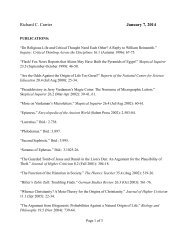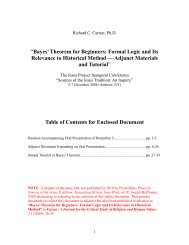Cultural History of the Lunar and Solar Eclipse in ... - Richard Carrier
Cultural History of the Lunar and Solar Eclipse in ... - Richard Carrier
Cultural History of the Lunar and Solar Eclipse in ... - Richard Carrier
Create successful ePaper yourself
Turn your PDF publications into a flip-book with our unique Google optimized e-Paper software.
<strong>of</strong> <strong>the</strong>ir <strong>in</strong>experience or superstition,” for <strong>the</strong> scientific truth “was not easy to<br />
apprehend,” 14 recogniz<strong>in</strong>g <strong>the</strong> difficulty <strong>of</strong> <strong>the</strong> concepts <strong>in</strong>volved.<br />
An excellent look <strong>in</strong>to <strong>the</strong> social world <strong>of</strong> eclipse lore is provided by Qu<strong>in</strong>tus<br />
Curtius Rufus, Seneca’s contemporary, who describes <strong>the</strong> superstitious reaction to a<br />
lunar eclipse by <strong>the</strong> army <strong>of</strong> Alex<strong>and</strong>er <strong>the</strong> Great, though his comments have a r<strong>in</strong>g <strong>of</strong><br />
contemporary relevance. 15 He records that Alex<strong>and</strong>er’s response was to manipulate<br />
<strong>the</strong>ir superstition by employ<strong>in</strong>g ‘Egyptian soothsayers’ (Aegyptios vates) to <strong>in</strong>terpret <strong>the</strong><br />
omen favorably. 16 Curtius <strong>the</strong>n lavishes a sackfull <strong>of</strong> loath<strong>in</strong>g on both <strong>the</strong> soothsayers<br />
<strong>and</strong> <strong>the</strong> credulous masses. His comments are <strong>in</strong>structive. He charges that although<br />
<strong>the</strong> soothsayers know very well <strong>the</strong> natural causes <strong>of</strong> an eclipse, “<strong>the</strong>y do not teach <strong>the</strong><br />
masses <strong>the</strong> knowledge that <strong>the</strong>y <strong>the</strong>mselves have learned,” 17 a charge that Curtius<br />
could as easily level at himself, s<strong>in</strong>ce it is unlikely that any member <strong>of</strong> <strong>the</strong> vulgus <strong>in</strong> his<br />
day would read his book, <strong>and</strong> <strong>the</strong>re was certa<strong>in</strong>ly no program at Rome to promulgate<br />
scientific lore to <strong>the</strong> people. Instead <strong>of</strong> propos<strong>in</strong>g a solution <strong>in</strong> mass education, or even<br />
an oral dissem<strong>in</strong>ation <strong>of</strong> natural science, Curtius has little sympathy for <strong>the</strong> <strong>in</strong>nocent<br />
vulgus, for “noth<strong>in</strong>g governs <strong>the</strong> multitude more effectively than superstition,” because<br />
<strong>the</strong>y are, “generally fickle, wild <strong>and</strong> lack<strong>in</strong>g <strong>in</strong> self-control” <strong>and</strong> because <strong>of</strong> this, “when<br />
seized by a false religion, <strong>the</strong>y are more obedient to soothsayers than <strong>the</strong>ir own<br />
leaders.” 18 It is unlikely that Curtius is th<strong>in</strong>k<strong>in</strong>g only <strong>of</strong> Alex<strong>and</strong>er’s soldiers. This is no<br />
doubt his op<strong>in</strong>ion <strong>of</strong> <strong>the</strong> vulgus <strong>of</strong> his own day.<br />
However, we get a different sp<strong>in</strong> on a similar story <strong>in</strong> Livy. Writ<strong>in</strong>g on <strong>the</strong> third<br />
Macedonian war, with <strong>the</strong> Roman legions about to engage <strong>the</strong> enemy at Pydna, Livy<br />
tells an <strong>in</strong>terest<strong>in</strong>g tale. Gaius Sulpicius Gallus, a man noted by Cicero as a geometer<br />
<strong>and</strong> astronomer, 19 was at that time a tribune <strong>of</strong> <strong>the</strong> soldiers. Know<strong>in</strong>g that a lunar<br />
eclipse was due to occur, <strong>and</strong> no doubt wish<strong>in</strong>g to avert a situation like that faced by<br />
Alex<strong>and</strong>er, Gallus conferred with <strong>the</strong> consul <strong>and</strong> summoned <strong>the</strong> soldiers for some basic<br />
<strong>in</strong>struction <strong>in</strong> astronomy, predict<strong>in</strong>g for <strong>the</strong>m <strong>the</strong> very hour <strong>of</strong> <strong>the</strong> event. His speech,<br />
<strong>and</strong> <strong>the</strong> reaction <strong>of</strong> <strong>the</strong> soldiers, as constructed by Livy, is noteworthy. “No one should<br />
regard it as a portent,” Gallus says, “because it happens accord<strong>in</strong>g to <strong>the</strong> natural order<br />
at established times <strong>and</strong> it can be predicted <strong>and</strong> known <strong>in</strong> advance.” 20 And so, he<br />
cont<strong>in</strong>ues, <strong>the</strong>y should not be amazed when it happens, any more than <strong>the</strong>y are when<br />
14 Plutarch, Nicias, 23.1-2.<br />
15 <strong>History</strong> <strong>of</strong> Alex<strong>and</strong>er, 4.10.1-7. The same eclipse is also reported without much ado <strong>in</strong> Plutarch,<br />
Alex<strong>and</strong>er, 31.8 <strong>and</strong> Arrian, Anabasis, 3.8.7.<br />
16 Arrian, Anabasis, 3.7.6, reports that it was Alex<strong>and</strong>er’s div<strong>in</strong>er Arist<strong>and</strong>er who <strong>in</strong>terpreted <strong>the</strong> omen favorably.<br />
17 rationem quidem ipsis perceptam non edocent vulgus. On <strong>the</strong> m<strong>in</strong>gl<strong>in</strong>g <strong>of</strong> science <strong>and</strong> superstition by div<strong>in</strong>ers<br />
<strong>and</strong> mages, see below, p. 34, 39-40, 43-4.<br />
18 nulla res multitud<strong>in</strong>em efficacius regit quam superstitio, alioqui impotens, saeva, mutabilis, ubi vana religione<br />
capta est, melius vatibus quam ducibus suis paret.<br />
19 On Old Age, 14 (49); accord<strong>in</strong>g to <strong>the</strong> elder Pl<strong>in</strong>y, he wrote a treatise on lunar <strong>and</strong> solar eclipses after this event<br />
(Natural <strong>History</strong>, 2.9 (53)), which may be <strong>the</strong> source for what Pl<strong>in</strong>y, Cicero, <strong>and</strong> o<strong>the</strong>r Romans knew about <strong>the</strong><br />
phenomena -- as well as this event (see below, p. 10).<br />
20 Livy 44.38.5-9: ne quis id pro portento acciperet...id quia naturali ord<strong>in</strong>e statis temporibus fiat et sciri ante et<br />
praedici posse.








